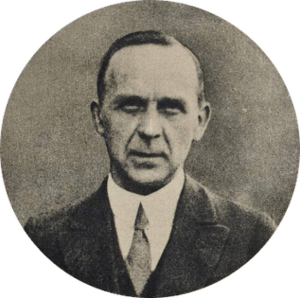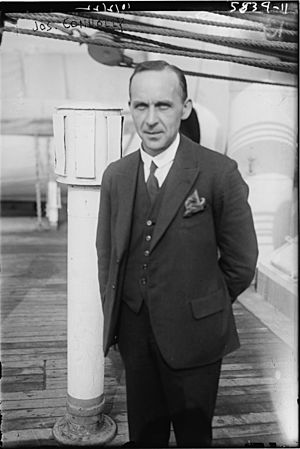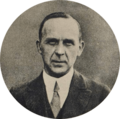Joseph Connolly (Irish politician) facts for kids
Quick facts for kids
Joseph Connolly
|
|
|---|---|

Joseph Connolly in 1933, as he appeared on a Fianna Fáil political poster
|
|
| Minister for Lands and Fisheries | |
| In office 8 February 1933 – 29 May 1936 |
|
| Preceded by | P. J. Ruttledge |
| Succeeded by | Frank Aiken |
| Minister for Posts and Telegraphs | |
| In office 9 March 1932 – 8 February 1933 |
|
| Preceded by | Ernest Blythe |
| Succeeded by | Gerald Boland |
| Senator | |
| In office 4 December 1928 – 29 May 1936 |
|
| Personal details | |
| Born | 19 January 1885 Belfast, Ireland |
| Died | 18 January 1961 (aged 75) Dublin, Ireland |
| Political party |
|
| Spouse |
Róisín McGavock
(m. 1916) |
| Children | 8 |
| Relatives | Con Lehane (nephew) |
| Education | St Malachy's College |
Joseph Connolly (born January 19, 1885 – died January 18, 1961) was an important Irish politician. He was a member of the Fianna Fáil political party.
Contents
Early Life and Interests
Joseph Connolly was born in Belfast, Ireland, in 1885. His father, John Connolly, was a baker. Joseph went to Milford Street School and St Malachy's College.
He was very proud of his Irish heritage. He joined groups like the Gaelic League, which promoted the Irish language, and the Gaelic Athletic Association, which promoted Irish sports. Joseph decided not to join his family's baking business. Instead, he first trained as an engineer. Later, he started his own furniture business in Belfast.
Starting in Politics
Joseph Connolly helped start the first "Freedom Club" in 1911. This club aimed to spread the ideas of Sinn Féin, an Irish political party. From 1914 to 1916, he was a leader of the Irish Volunteers in Belfast. This group was formed to protect Ireland's right to self-rule. In 1916, he married Róisín McGavock, and they had eight children together.
The Easter Rising and Its Aftermath
In April 1916, Joseph was in Dublin during the Easter Rising. This was an important rebellion against British rule. He was asked to deliver a message to stop the uprising in some areas. However, the rebellion went ahead in Dublin. After the Rising, Connolly was arrested in Belfast. He was held in prisons in England, including Knutsford and Reading Gaol.
After his release, he helped rebuild Sinn Féin in Belfast. He ran as a candidate for Sinn Féin in the 1918 general election. Even though he didn't win, he received many votes. He also worked for the First Dáil, which was Ireland's first independent parliament.
Diplomatic Work in the United States
From 1921 to 1922, Joseph Connolly served as the Consul General for the Irish Republic in New York City, USA. His main job was to counter negative stories about Sinn Féin and the IRA. When the Anglo-Irish Treaty was signed, he was careful about giving his opinion. He worried it might cause divisions. After the treaty, he returned to Ireland. His family moved to Dublin and never went back to Belfast.
A Career in Government
After a break from politics, Joseph Connolly joined the Fianna Fáil party in 1926. In 1928, he was elected as a member of the Seanad Éireann, which is like the Irish Senate. He served there until 1936. He became the leader of the Fianna Fáil group in the Seanad.
Serving as a Minister
After the 1932 general election, Éamon de Valera made Joseph Connolly the Minister for Posts and Telegraphs. This was special because he was the first person to be a Minister while being a member of the Seanad, not the Dáil (the main parliament). As a minister, he traveled with de Valera to Geneva to attend meetings at the League of Nations.
In 1933, after another election, he became the Minister for Lands and Fisheries. One of his main tasks was to oversee the Land Commission. This group worked to share land more fairly among farmers. In 1934, his role changed slightly to Minister for Lands, and he also oversaw forestry. He encouraged more tree planting across Ireland. He stopped being a Minister when the Seanad was abolished in 1936.
Later Life and Work
From 1936 to 1950, Joseph Connolly was the Chairman of the Office of Public Works (OPW). This office manages public buildings and projects. During World War II (which Ireland called "The Emergency"), he was appointed Controller of Censorship in 1939. His job was to control what news and information could be published or sent through mail. He wanted to make sure nothing favored either side in the war. This role sometimes led to disagreements with newspapers and other politicians.
He returned to the OPW in 1941 and retired in 1950. Joseph Connolly also wrote plays, including The Mine Land. He was also a director for The Irish Press newspaper for a time. He passed away in 1961, just before his 76th birthday.
Images for kids




